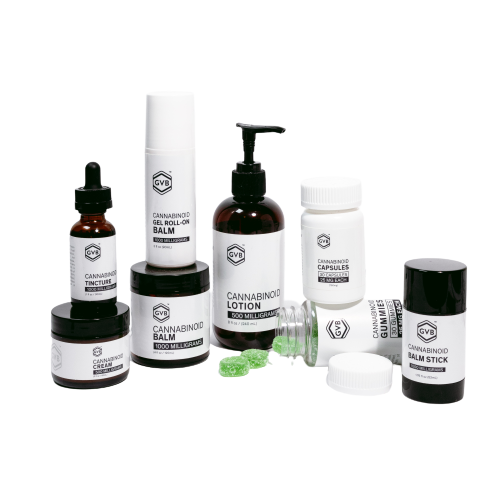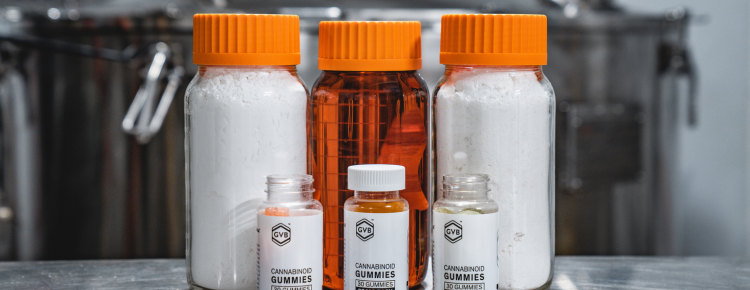Convenience stores are among the smaller contributors to the overall CBD economy. The US cannabidiol industry was estimated to be worth approximately $5 billion in 2021, of which convenience stores (c-stores) only made up $42.7 million, reports legacy market analysis publication Convenience Store News & Petroleum (CSP).
Despite its limited impact on the wider CBD economy, however, the behavior of CBD products in gas stations and convenience stores can tell us a lot about American sentiment toward CBD and how the cannabinoid is fitting into existing habits. In this guide, we’ll take a close look at CSP’s 2021 CBD data¹ to reveal new insights into the evolving status of the brick-and-mortar CBD market.
A “slow-burning” CBD industry
Tirey applauds product innovations in 2021 that made CBD more appealing to gas station customers. “Look at the inclusion of vape CBD products… [f]lavor profiles for beverages have [also] drastically improved over the last year.”
The key insight of this preface is that the growth of the CBD industry within convenience stores appears to have stabilized but is still robust. Executives at gas stations seem keen to provide customers with what they want, which are primarily CBD vapes and other products aimed at stress relief.
The latest CSP data
We now turn to the data CSP provided on the status of the convenience store CBD industry. Overall, the numbers are positive with some obvious areas to target for maximal growth.
Note: Any category names used in the following sections are descriptions CSP used. They are not intended to refer to the regulatory status or therapeutic properties of the products categorized.
2021 CBD convenience store gross sales
First, CSP covers the total sales CBD products grossed in convenience stores across all of its conventional product categories. Traditional market analysts have been forced to find ways to categorize CBD products, which they mostly refer to as “vitamins” or “electronic smoking devices.”
All values are provided in millions.
Vitamins
– Convenience store total sales: $13.4
– Percent changed over last year: 41%
– Unit sales in convenience stores: 1.3
– Percent changed over last year: 36.9%
Electronic smoking devices
– Convenience store total sales: $12.3
– Unit sales in convenience stores: 0.5
– Percent changed over last year: 326.3%
Bottled water
– Convenience store total sales: $3.4
– Percent changed over last year: 17.6%
– Unit sales in convenience stores: 0.8
– Percent changed over last year: 10.8%
Analgesic rubs
– Convenience store total sales: $2.4
– Percent changed over last year: 51.2%
– Unit sales in convenience stores: 0.8
– Percent changed over last year: 10.8%
Sleeping remedies
– Convenience store total sales: $2.2
– Percent changed over last year: 70.5%
– Unit sales in convenience stores: 0.2
– Percent changed over last year: 47.4%
Smoking accessories
– Convenience store total sales: $1.1
– Percent changed over last year: 0.6%
– Unit sales in convenience stores: 0.7
– Percent changed over last year: 0.9%
Carbonated beverages
– Convenience store total sales: $0.7
– Percent changed over last year: 7.4%
– Unit sales in convenience stores: 0.2
– Percent changed over last year: 10.2%
Seasonings
– Convenience store total sales: $2.2
– Percent changed over last year: 6.4%
– Unit sales in convenience stores: 0.2
– Percent changed over last year: 5.6%
2021 CBD convenience store sales by category
CSP further separated 2021 CBD sales into its six main product categories. CBD sales were only substantial in four out of the six categories, though, data for which are provided below:
Other tobacco products
– Convenience store total sales: $3.4
– Percent changed over last year: 161%
Health & beauty
– Convenience store total sales: $5.3
– Percent changed over last year: 44%
Packaged beverages
– Convenience store total sales: $0.2
– Percent changed over last year: 28.1%
Alternative snacks
– Convenience store total sales: $0.1
– Percent changed over last year: 15%
Percentage of sales per category
Out of the stated $42.7 grossed by CBD products in convenience stores in 2021, the vast majority (74%) came from the health and beauty category ($17.6). The next highest-percentage category (21%) was CBD-infused “tobacco products,” including vapes ($5.1). Packaged beverages and alternative snacks made up 2% and 1% respectively.
Top convenience store CBD subcategories in 2021
The categories CSP has used so far make more sense to gas station executives than they do to CBD entrepreneurs. CSP makes it a bit simpler, though, by breaking its numbers down into more-familiar subcategories. Again, these category names aren’t being used to describe the regulatory status or therapeutic purposes of CBD:
OTC medications
– Convenience store total sales: $4.8
– Percent changed over last year: 41%
Vapes
– Convenience store total sales: $2.4
– Percent changed over last year: 105%
Skincare
– Convenience store total sales: $0.5
– Percent changed over last year: 36%
Smokeless tobacco products
– Convenience store total sales: $0.4
– Percent changed over last year: 4%
Tobacco products
– Convenience store total sales: $0.3
– Percent changed over last year: 46%
E-cigarettes
– Convenience store total sales: $0.2
– Percent changed over last year: 13%
2021’s top CBD brands in convenience stores
Even if you’re well versed on the top brands of the online CBD industry, you might be caught by surprise by some of the top names in gas station CBD. An almost entirely different set of brands have started fighting for space within the convenience store CBD industry, including:
– Sky Wellness
– Whisl
– Reliva
– Floyd’s
– Hemp Bombs
– Cannadips
– Hempzilla
– Pana
– CBDaFI
– Forth
Further data
Beyond this basic information on the flow of CBD-related money within convenience stores, CSP goes on to dive deeper into some more detailed areas of data. Here are summaries of the remaining insights from CSP’s report on CBD:
Purchasing frequency
A full 28% of convenience store customers now buy CBD at least once per month — with that percentage jumping to 44% among individuals between ages 18 and 34.
Once shown details about CBD products, CSP found that 33% of convenience store customers who previously weren’t interested in CBD started showing interest.
Convenience store customers 35 and older were the least likely to be interested in CBD with 79% saying “no.” This massive gap of interest between generations suggests that younger people are starting to view gas stations and convenience stores as reliable sources of CBD products.
Display habits
Convenience store owners may be tired of CBD brands insisting that they display products separately, but creating a special section just for CBD products appears to simply be good business sense. Young (53%) and old (74%) convenience store customers agree: CBD products should be separated from other products to avoid confusion. Overall, 64% of convenience store patrons believe this would be a good idea.
Interest in CBD food
Currently, the FDA prohibits CBD from being present in food. However, 77% of individuals who currently purchase CBD products at convenience stores would like to be able to purchase CBD food as well.
Favorite CBD food items
Which CBD-infused foods would customers buy at convenience stores if they had the opportunity? Here are CSP’s most popular answers:
– Cold beverages (48%)
– Baked goods (44%)
– Hot beverages (38%)
– Frozen beverages (38%)
– Snacks (38%)
– Beverage enhancers (34%)
– Condiments, sauces, flavorings (33%)
– Full meals (27%)
Reasons for not wanting to buy CBD
For the most part, convenience store customers who don’t want to buy CBD simply don’t want to buy it (64%). Out of those who go on to provide an actual objection, 23% say they simply don’t know enough about CBD. Fifteen percent cite safety concerns, which are interestingly more prevalent among younger customers.
Only 6% of averse convenience store customers now choose not to use CBD because they think it would get them high, proving that the industry has been successful in dispelling this myth.
Analysis
The data in this report make clear that young people are relying upon gas stations for their CBD needs and primarily are interested in unconventional products, most notably vapes. Older CBD users may be unaware that CBD products are available at convenience stores or they may simply be accustomed to purchasing CBD online.
Older individuals who shop at convenience stores seem comparatively uninterested in CBD products. Due to these prevailing dynamics, attempts to market CBD products that are not related to vaping, food, or beverages in convenience stores are unlikely to be as successful as efforts to market such products online.
Though it may seem like a flash in the pan at this point, the younger generation’s interest in buying vape and beverage CBD products at convenience stores should not be overlooked. CBD has undeniably caught on within the convenience store environment, and now it’s simply a matter of adapting CBD product portfolios to the environment’s unique dynamics.
Convenience store CBD sales FAQ
Dive deeper into the significance of convenience store CBD sales in the FAQ section below:
1. Can you buy CBD at gas stations?
Yes, CBD products are now widely sold at gas stations throughout the United States. In fact, it is most likely that more gas stations than not carry at least a few CBD products with many devoting entire sections or shelves to products containing CBD.
To gas stations, CBD products are easy sells that bring in high margins. To CBD users, gas stations are convenient places to buy CBD products. The combination of these two genuine economic benefits has caused CBD and gas stations to take to each other like kindling to a flame.
2. Can you buy CBD at convenience stores?
Yes, CBD is now available at many convenience stores throughout the nation — whether they are connected to gas stations or not. Even urban convenience stores with not a gas pump to be found commonly carry CBD products due to their popularity and profitability. If you are unsure whether a convenience store near you carries CBD products, check their online reviews. Searching for keywords like “CBD gummies” will help you find reviews that mention these products.
3. Who has the biggest CBD retail stores?
Since there is no centralized reporting system for this new segment of the economy, it is unclear which company currently operates the greatest number and largest-sized CBD retail stores in the country. As you make your estimations, keep in mind that specialty stores selling only CBD generally sell fewer overall products due to their decreased foot traffic. If stores that also sell non-CBD products are taken into account, it’s likely that either Kroger or Whole Foods would be considered the largest CBD retail chain.
4. Are CBD stores successful?
Some CBD specialty stores have been quite successful. The best results have been achieved when stores honestly and transparently sell well-known products at comparable prices to what you would find online without misleading shoppers or behaving in a predatory manner. It remains an undeniable fact, though, that large retailers continue adopting CBD products, threatening to gradually push specialty stores out of the market.
Sources
- Lindenberg, G. (2022, November 9). ‘Americans Are in Love With C-Stores’: Survey. CSP Daily News. https://www.cspdailynews.com






